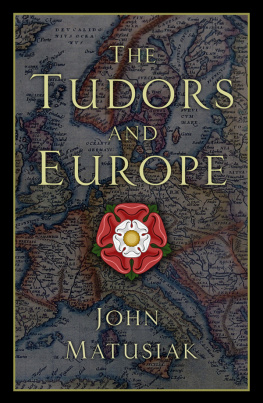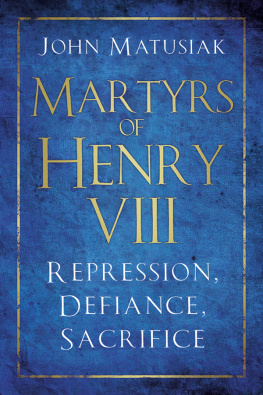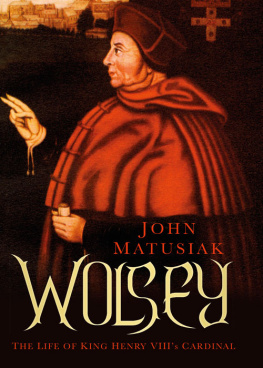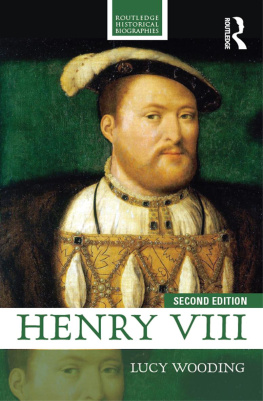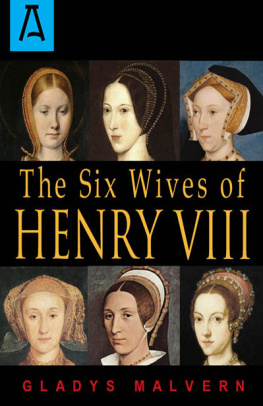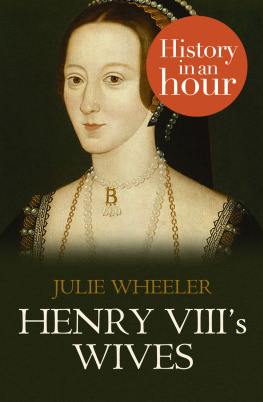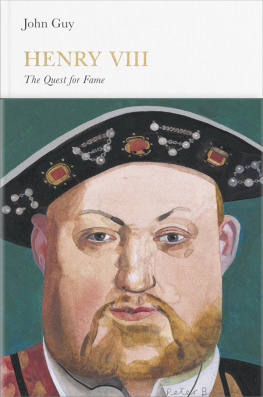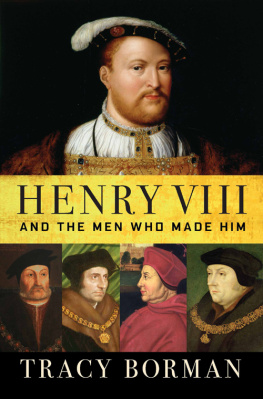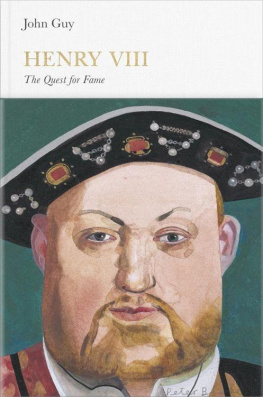Let us cease to sing the praises of the English Nero
Philipp Melanchthon, 1540
Contents
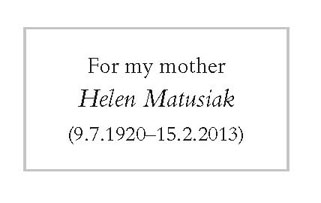
Though authors may well be forgiven for thinking otherwise, most books are ultimately committee products, and none more so than those whose subject is the past. The reign of Henry VIII has, of course, attracted more than its fair share of exceptional scholars and gifted popular biographers, and many have left their own particular imprint upon this altogether humbler endeavour. As a result of their dedication, there appear, for now, to be few new facts to glean and even fewer genuinely novel trails of research to blaze. But if the highways and byways of Henrys reign have been well trod, fresh perspectives and new syntheses are always available, especially where the man himself is concerned. In this, perhaps, lies the permanent allure of much historical writing. Certainly it lies at the heart of what follows.
I am as indebted as any author can be to a host of influences and legion of authorities, too numerous, sadly, even to be remembered let alone listed. The efforts of Lacey Baldwin Smith, Carolly Erickson, John Bowle, Neville Williams, Charles Ferguson and Marie Louise Bruce have both inspired and informed my work. And though the blame for any flaws is mine alone, I shall remain grateful both to them and countless others who have helped the book on its way. For, if ever a work arrived at its final destination by twists of chance and gusts of unexpected good fortune, it is this one. To Mark Beynon, who plucked it from its attic resting place, I owe a vote of special thanks. Likewise, a timely word of remembrance is surely due to the trio of eminent men who set the template for my education at the University of London precisely forty years ago. The late S.T. Bindoff, A.G. Dickens and Joel Hurstfield were all magisterial figures, and if the first, in particular, was so much more devoted to archival positivism than I, it remains to his infinite credit. In the years that followed, some of my own students also played no small role in helping frame my ideas. Yet it is to Barbara and the rest of my family, as well as my small circle of special friends, that I am especially indebted. To those others who supported and encouraged, I offer my hand. They know who they are.
1
You have vanquished your enemies; you have gained many kingdoms; you have subdued many empires; you have acquired sovereignty of the entire east: but all the same you have neglected to control, or have been unable to govern, the small domain of your mind and body.
Aristotles words to Alexander the Great, quoted to the future Henry VIII by his tutor John Skelton.
The birth of Henry VIII, unlike that of his elder brother, Arthur, was a distinctly muted episode. When Arthur, Prince of Wales, was born four weeks prematurely on 20 September 1486, he was hailed at once as the rosebush of England, the living embodiment of lasting union between the rival houses of York and Lancaster. Accordingly, the place of his birth was chosen in careful symmetry with his first name both to conjure a sense of long tradition and to affirm the mystique of his exalted station. Winchester was, after all, the ancient capital of the countrys legendary past and in its cathedral hung the Round Table itself, freshly painted with Tudor emblems. As riders sped through the late summer countryside to herald the comfortable good tidings, bells pealed and joyous Te Deums resounded in chapels far and wide. In thronging streets huge bonfires blazed and roared to mark the rejoicing of every true Englishman, while at court, the Italian poets Pietro Carmeliano and Giovanni Gigli soared into raptures of exultant Latin verse in honour of the baby prince sent at last to heal a nations wounds.
If, however, there was like rejoicing nearly five years later on 28 June 1491 when Henry VIII slipped into the world, no chronicler records it. His christening in the church of the Franciscan Observants, to which the silver font from Canterbury Cathedral had been specially transported, was duly elaborate and, having been cleansed supposedly of the evil spirit, he was borne from the service in reverent style, preceded by the jubilant sound of trumpets and pipes and a splendid array of his godparents gifts of gold and silver plate. Yet though the king and queen considered their second son an entirely welcome addition, they hailed him more as safeguard than saviour, a hopefully unredeemed insurance policy for his elder brother against the vagaries of Renaissance medical science. On this occasion, too, just as poets were wholly underwhelmed, so posterity was largely overlooked. Amid the yawning propaganda vacuum, Bernard Andr, the royal historian, devoted no more than fifty words to the new princes birth in his Vita Henrici VII, including in the same inconsequential passage an incidental announcement of the birth of an elder sister, Margaret.
A similar vaguely half-hearted attitude seems to have influenced the choice of Henrys birthplace. Neither Winchester nor Westminster (where Margaret had been born) was this time selected for the purpose. Instead, the lusty infant heaved his first breath at the palace named Placentia, better known to us today as Greenwich, which was then esteemed less for its weighty historic significance than for its sweet air, agreeable river setting and reassuring distance from the plague-ridden capital. It was here that Prince Henry, anointed with oil, sprinkled with rosewater and swaddled in blue velvet and cloth-of-gold, was first laid in the great cradle of estate. Like all new born babies he was, as yet, an innocent genetic mystery waiting to unravel with circumstance.
Some six years earlier, in September 1485, the infants father had been greeted in London for the first time as Henry VII. Though received at Shoreditch amid magnificent display, he was still as yet a mysterious king from nowhere, whose legitimacy was derived from little more than Englands desperation in that hour. While his great-grandfather had gained infamy as a fugitive Welsh brewer wanted for murder, his paternal grandfather had found fortune and influence only by seducing Henry Vs French widow after some years as an official of her household. It was true that the new kings mother, Margaret Beaufort, was descended from John of Gaunt, but only from the wrong side of the blanket and although a parliament had made her legitimate along with her children, it had also expressly barred them from the throne. If, in any case, Henry VIIs claim came through his mother, it was she and not her son who should have been crowned. But, in spite of this inauspicious pedigree, it was the improbable victor of Bosworth Field who had ultimately come to lay his battle banners at St Pauls, with trumpets sounding, and it was he who would demonstrate the strength to hold as well as the will to get in a land accustomed to turbulence.
The French vice is lechery and the English vice treachery, ran the saying, and no impartial observer could have doubted at least the second half of this maxim when the first Tudor cautiously mounted his throne. Though for nine-tenths of the population the protracted and disjointed squabbles that today we call the Wars of the Roses were little more than kings games, a contemporary parliamentary petition had still complained how in divers parts of this realm, great abominable murders, robberies, extortions, oppressions and other manifold maintenances, misgovernances, forcible entries, affrays and assaults be committed, and as yet remain unpunished. Estate jumping, abduction of heiresses and casual brigandage had become, in effect, a modish pastime for the high-born Englishmen depicted to this day on their tombs and brasses in plate armour. Indeed, no less a figure than Sir Thomas Malory, who had apparently written
Next page


